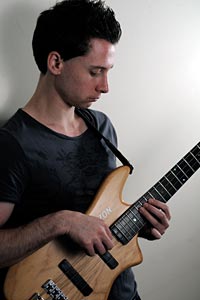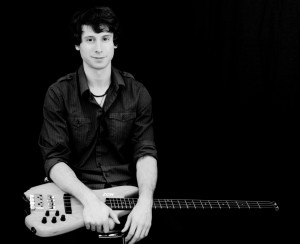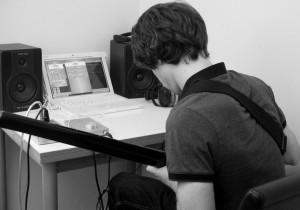
Did you you know that YouTube’s Zander Zon used to play in a punk band?
Did you also know Zander Zon used to play with a pick?
How about that his famous Zon bass is the only one that he owns?
– – –
Zander Zon is one of those players that has crossed the sights of pretty much every bass player searching YouTube for bass guitar-related entertainment. Most searches yield performances from Jeff Berlin, Stu Hamm, Richard Bona and Michael Manring but it is not uncommon to find Zander in that search query.
Guaranteed, just about every bass player at some point has had one of these videos cross their sights and equally assured that when you were finished watching that video, you thought, “Wow – I need to go practice. Now!” Few bass players have the ability to spur action like that in other players, regardless of skill level or how many years have been put into the instrument, but Zander Zon is certainly among those players.
A brief look at Zander’s YouTube channel will reveal an extensive online library of covers and original pieces that have been compiled over almost 6 years. With each piece, it’s very clear that there was a tremendous amount of time and attention put into each piece. Whether it was a cover of a popular song like The Killer’s “Mr. Brightside” and Imagine Dragon’s “Radioactive, or traditional piece like Scarborough Fair or even a classical piece like Pachabel’s Canon.
Though we’ve all been amazed by Zander’s work over the years, it’s pretty safe to say that not many of us really know much about him. Where did he come from? Why is he called Zander Zon? Why Zander? Did he always play bass? Did he come from another instrument? Does he tour and if so how can I get tickets?
To many of us, he might just be the guy on the Internet who can play the heck out of the bass guitar and nothing more, but to some of us, there has to be more to the man. There simply can’t not be.
I reached out to Zander via email with a proposition for an interview and was thrilled to check my Inbox the day later and see a response and a desire to have this interview! Well, Smart Bass readers, this is that interview with YouTube’s very own, Zander Zon. Enjoy.
Note: bolding is my own addition.
– – – –
Mike Emiliani (ME): You mentioned in a past interview with iBass that you originally started off in music as a cellist. Can you share some more of your early musical background?
Zander Zon (ZZ): My parents used to say they regretted not being trained on instruments when they were younger, so they made sure my sisters and I received lessons. My older sister plays violin and my youngest plays piano – both are fantastic musicians. Classical music was definitely a huge part of my childhood and I think it played a massive role in developing my musical ear and passion for music. In high school and college, I got really into punk rock and played in a couple bands.
(ME): What caused you to make the change over to electric bass from cello? How was the change over looking back?
(ZZ): I was made to practice cello for at least 30 minutes a day for about 10 years – I started enjoying this less when I became a teenager. When I was 17, my friends started a band and needed a bass player. I thought, well the cello has four strings and so does the bass guitar, so I’ll do it. I remember being happy with the bass bass since I didn’t need to worry about playing any chords, which I think is pretty funny considering that’s a huge part of what I do on bass these days! I also played with a pick for the first 4 years.
In college, after the bands didn’t work out, and after I made a big move from California to England, I remember wanting to play songs without having to rely on other band members; it was around this time that I first heard Victor Wooten. So, I started off playing classical cello pieces, like Bach’s cello suites, on acoustic bass. About a year later, I heard Michael Manring’s ‘Music for Armchair Funambulists’ and ‘Selene’, and decided that was the direction I wanted to go in.
(ME): Diving back into the catacombs of your YouTube channel, you seem remarkably consistent with gear! If there’s a change from the Zon, it’s to an electric cello. What’s the story behind you and Zon basses and your setup? How much trial and error was involved until you found the setup that works for you? How did you choose those particular basses and was there a time when you went by another name like Zander Fender or Zander Ibanez?
(ZZ): Haha, well firstly ‘Zander Zon’ is the name I started using when I first began releasing videos onto YouTube. I didn’t think too much about the name, as I was just some guy uploading videos of himself playing bass and was really just experimenting with YouTube. My middle name is Alexander and I played a Zon bass, so I came up with ‘Zander Zon’. I just thought it sounded cool to be honest! However, as they videos got some views, and that’s how I became known on the Internet, it turned out that that was actually the name I had to stick with. If I could do it again, I probably would have just used my real name.
 The Zon VB4 is the only bass I own. Joe Zon makes amazing instruments and Michael Manring is my favourite bassist – so it made sense to get my hands on one! When it comes to amps, it took me a long time to find one that I really liked. The Fishman Solo Amp was recommended to me by my friend and amazing stick player, Rob Martino. And it works well for what I do.
The Zon VB4 is the only bass I own. Joe Zon makes amazing instruments and Michael Manring is my favourite bassist – so it made sense to get my hands on one! When it comes to amps, it took me a long time to find one that I really liked. The Fishman Solo Amp was recommended to me by my friend and amazing stick player, Rob Martino. And it works well for what I do.
(ME): You mentioned in a previous interview that you were a self-taught player and learned the instrument through jamming to your favorite acts. Also in a previous interview with iBass, you seemed to really know your chord theory and music theory. How did you approach learning music theory?
(ZZ): I think it started out just figuring out chord progressions and how bands put songs together. I did a lot of listening, watching and then experimenting when writing music myself. My girlfriend is a great musician and I’ll talk to her a bit about theory, chord voicings, progressions, etc. For me, playing an experimental style where you try out different tunings really helps as well, because you’re not necessarily doing things because of theory, you’re doing it because it sounds good. So when I compose, it’s probably more to do with my ear than theory.
(ME): How has your practice routine evolved since you first started playing?
(ZZ): It’s become more focused. I know exactly what I want to accomplish from the session and I’ll focus solely on that. I’m also thinking more about sounds and textures these days as well – so maybe it’s become a bit more about the technique. That almost sounds ‘non-musical’ saying that, but with solo music, the timbres and textures are really important.
(ME): Of course you’re best known for your solo work on YouTube. Why solo bass versus being a bass player in a band or a larger ensemble?
(ZZ): I guess I just evolved that way. The circumstances I mentioned earlier – having a classical background, things not working out in a college band, moving to England, hearing what Michael Manring and Victor Wooten were doing… all these played a part. I also really like having complete control over my musical endeavours. That’s a big one for me. I do think at some point I’d like to play in a band again. I don’t know what type of music, or when, but I think at some point I’d like to be part of that again.
(ME): Can you provide some insights into how you determine what songs will turn into solo bass arrangements and once you’ve picked a song how long does it take to arrange it, practice it and get it to YouTube? What does your process look like? What sounds “good” to Zander Zon?
(ZZ): Most importantly, I have to really like the song. Next, I have to be able to play it! Songs with fast melodies don’t  tend to work as well for me; neither do songs where there’s lots of key changes. Being able to play root notes with open strings is important so if there’s key changes or too many different types of chords, it becomes more challenging.
tend to work as well for me; neither do songs where there’s lots of key changes. Being able to play root notes with open strings is important so if there’s key changes or too many different types of chords, it becomes more challenging.
The length of time it takes to arrange songs will vary: sometimes it takes me a day, other times it takes me a month. These days, I try to figure out the melody and harmony while at the same time working out an interesting way of playing it. A lot of the time, an unconventional way of playing the music, like with harmonics or tapping, is actually the only way I can get the notes. That’s the thing about playing solo bass – the limitations can breed creativity.
After I work out how to play all the notes, it’s about trying to create a variety of sounds and adding some spice to the different parts of the tune. This is where listening comes in for me. I’ll record myself playing the song in different ways, listening and making changes after each recording, until I’m pretty happy with each of the sections. Then I’ll practice it for a bit, properly record the tune and get it onto YouTube.
(ME): What does your current setup look like for both bass guitar and recording? How has it changed over the years? (picture if possible)
(ZZ): My setup for bass guitar is my Zon VB4, Fishman Solo Amp, Boss GT10 and Line 6 DL4. For recording, I use a SmartResearch DI box, Apogee Duet and Logic. I record the video using a pretty standard Sony camcorder then edit the video using Final Cut Pro. Originally I just recorded using the camera on my Macbook and didn’t do any editing, but I’ve tried to change with the times and become a bit more sophisticated with my video set up. I’ve also begun using some pretty cool reverbs, like Space Designer and ArtsAcoustic.
(ME): How was producing, recording and arranging for Sonorous a different experience then for your latest release, Saturn Return?
(ZZ): On Saturn Return, ‘A Whisper in Time’ featured electric cello, ‘Music Box’ featured a bit of electric piano and ‘Oracles of Her’ had three types of distortion; on Sonorous, it was all VB4. I also knew what I was doing a bit more on Saturn Return; with Sonorous, I was doing everything for the first time, so it was a pretty steep learning curve. I felt more comfortable producing Saturn Return.
(ME): Break down the average gig for you. From booking the show all the way to the end of the show.
(ZZ): I’ve actually made a decision not to gig as much recently. Where I’m at now, what I want to do is focus on recording and releasing albums and videos. I really like playing live and there’s of course no substitute for that. But my main passion at the moment is creating recordings/videos: I love being able to share my music with people from around the world and I love creating something that is going to stay.
(ME): What are some other things that Zander Zon likes to do in his free time?
(ZZ): Hanging out with my girlfriend/friends/family, watching films (recent favourites: Ruby Sparks; The Place Beyond the Pines), watching TV shows (Game of Thrones, The Office, The Wire) going out to dinner (Italian food; Thai food), playing tennis (favourite players: Andy Murray, Rafael Nadal) or basketball (teams: Los Angeles Lakers, Golden State Warriors), reading (recent fav: The Girl with the Dragon Tattoo).
(ME): What advice would you give to bassists looking to delve into solo bass playing?
(ZZ): It’s all about effort, right? The more practice time and listening time you can get in, the better.
(ME): Last but not least: any projects or people you’d like to plug right now?
(ZZ): Bassline Publishing is releasing a new book on tapping which looks great. Also, solo bassist Aram Bedrosian is releasing a new album this year, which, from what I’ve heard, is going to be awesome. And lastly, many thanks to Smart Bass Guitar for the interview!
Get involved with Zander:
- How to Set up a Pedal Board for Bassists - June 16, 2021
- The Best Bass Guitar Effects Pedals Guide You’ll Ever See [INFOGRAPHIC] - April 24, 2020
- The Ultimate Beginner’s Guide to Everything About Bass Guitar Strings - March 20, 2020
